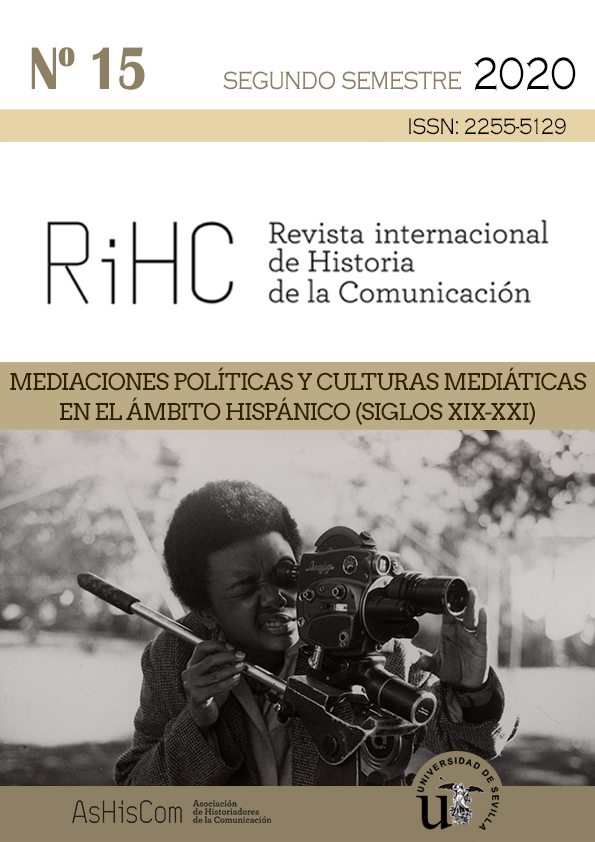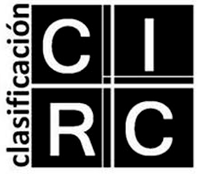Representations of the alternative in Madrid during the transition to democracy: the case of free radios’ mediatic (counter)culture (1976-1989)
DOI:
https://doi.org/10.12795/RiHC.2020.i15.05Keywords:
Historia, radios libres, TransiciónAbstract
In the 1980s, a multitude of small radio stations proliferated in the Spanish ether, posing a new way of doing and understanding communication, and constituting a new social movement: that of free radios. A movement that was born and grew within an alternative subculture, close to the radical left, for which it played the role of an instance of ideological production and reproduction. In these pages we will see how the media counterculture that surrounded these stations generated a subcultural style based on the transformation and resignification of language that helped to build an identity and a representation of the alternative in Madrid during the Transition to democracy.
Downloads
References
AGUILERA, M. (1985), Radios libres y radios piratas, Madrid, Forja.
ALGUACIL, J. (25 de mayo de 1983), “Radios libres en Madrid”, Cisneros, p. 15.
ALTHUSSER, L. (2014), “Ideología y aparatos ideológicos del Estado (notas para una investigación”, en Althusser, L., La filosofía como arma de la revolución, Barcelona, Anthropos, pp. 95-142.
BARRANQUERO, A. y MEDA, M. (2015), “Los medios comunitarios y alternativos en el ciclo de protestas ciudadanas desde el 15M”, Athenea Digital, 15(1), pp. 139-170.
CAMACHO PALENCIA, A. (11 de mayo de 2018), “El movimiento antinuclear en España 1977-1990)”, en Ecologistas en Acción. Disponible en internet (20-8-2020): https://www.ecologistasenaccion.org/16239/el-movimiento-antinuclear-en-espana-1977-1990/.
CAMPS DURBAN, E. (2019), Fem-nos escoltar! Història de les ràdios ciutadanes de l’espai català de comunicación (1977-2017), Maçanet de la Selva, Gregal.
CLARKE, J. (2014), “Estilo”, en Hall, S. y Jefferson, T. (eds.), Rituales de resistencia. Subculturas juveniles en la Gran Bretaña de postguerra, Madrid, Traficantes de Sueños, pp. 271-292.
DEO, F.; DOLÇ, M. y SANCHÍS, V. (1985), Radios Lliures: una práctica alternativa, Barcelona, Terranova.
GARCÍA GARCÍA, J. (2013), “Transformaciones en el Tercer Sector: el caso de las radios comunitarias en España”, adComunica. Revista de estrategias, tendencias e innovación en comunicación, nº 5, pp. 111-131.
―. (2017), “Transformaciones y aprendizajes de las radios comunitarias en España: hacia un modelo de radio inclusiva”, Disertaciones. Anuario electrónico de estudios en comunicación social, 10(1), pp. 30-41.
GUERRA, P. (2019), “Rádio Caos:resistência e experimentação cultural nos anos 1980”, Análise Social, nº 231, pp. 284-309.
HALL, S. (1970), Los hippies: una contra-cultura, Barcelona, Editorial Anagrama.
―. (2009), “The spectacle of the other”, en Hall, S. (ed.), Representation. Cultural representations and signifying practices, Londres, Sage Publications, pp. 223-290.
HALL, S. y JEFFERSON, T. (eds.) (2014), Rituales de resistencia. Subculturas juveniles en la Gran Bretaña de postguerra, Madrid, Traficantes de Sueños.
HEBDIGE, D. (2004), Subcultura: el significado del estilo, Barcelona, Paidós.
LA CADENA DEL WATER (sin fecha), “Cuñas Radio La Voz de la Experiencia. Cadena del Water. Inicio de emisiones”, en Youtube. Disponible en internet (30/07/2016): https://www.youtube.com/watch?v=pBooUuH1MnI.
LACEY, K. (2009), “Ten years of Radio Studies: the very idea”, Radio Journal: International Studies in Broadcast & Audio Media, 6(1), pp. 21-32.
―. (2018), “Up in the air? The matter of Radio Studies”, Radio Journal: International Studies in Broadcast & Audio Media, 16(2), pp. 109-126.
LEFEBVRE, T. (2008), La bataille des radios libres 1977-1981, París, Nouveau Monde Editions.
LEMA, I.; RODRÍGUEZ GÓMEZ, E. y BARRANQUERO, A. (2016), “Jóvenes y tercer sector de medios en España: formación en comunicación y cambio social”, Comunicar, nº 48, pp. 91-99.
MARTÍN CABELLO, A. (2006), La Escuela de Birmingham. El Centre for Contemporary Cultural Studies y el origen de los estudios culturales, Madrid, Servicio de Publicaciones de la URJC.
MARTÍNEZ, M. (1998), “Islas de autogestión en un mar de contradicciones. Cuatro movimientos sociales en el Estado español (1978-1998)”, Hartza. Disponible en Internet (2-8-2020): http://miguelangelmartinez.net/IMG/pdf/1998_movimientos_sociales_Gijon.pdf
MOREY, M. (1977), “Los indios metropolitanos ensayan la revolución”, El Viejo Topo, nº 8, pp. 65-66.
PASCUAL, J. (2019), Movimiento de resistencia. Años 80 en Euskal Herria. Radios libres, fanzines y okupaciones, Tafalla, Txalaparta
PERROTTA, M. (2013), “Storia della radio in Itlia in quattro atti”, en Bonini, T. (ed.), La radio in Italia. Storia, mercati, formati, pubblici, tecnologie, Roma, Carocci Editore, pp. 29-72.
PRADO, E. (1981), “El movimiento por la libertad de emisión en España”, en Bassets, L. (ed.), De las ondas rojas a las radios libres, Barcelona, Gustavo Gili, pp. 237-255.
―. (1983), Las radios libres. Teoría y práctica de un movimiento alternativo, Barcelona, Mitre.
―. (1999), “Las otras radios”, en Balsebre, A. (coord.), En el aire. 75 años de radio en España, Barcelona, Promotora General de Revistas, pp. 224-231.
RADIO CIGÜEÑA (sin fecha), “… y de postre?” en Radio Cigüeña. Disponible en internet (04/01/2015): http://www.radiociguena.org/imag/rcfiestaspermanente.jpg
RODERO, E. (2009), “Y siempre, por último, con ustedes: la radio. Revisión de la producción bibliográfica y hemerográfica radiofónica en España”, Admira, nº1, pp. 98-126.
SANTOS DÍEZ, Mª T. (1994), Radios comerciales — ondas libres, Bilbao, Onda Cero.
SANTOS DÍEZ, Mª T. (1999), La radio vasca (1978-1998), Bilbao, Servicio Editorial Universidad del País Vasco.
SOBÓRNEZ, A. (2008), Entrevista personal, Madrid.
THEODOSIADOU, S. (2010), “Pirate radio in the 1980s: a case study of Thessaloniki’s pirate radio”, The Radio Journal — International Studies in Broadcast and Audio Media, 8/1, pp. 37-49.
VAN DER HOEVEN, A. (2014) “The popular music heritage of the Dutch pirates: illegal radio and cultural identity”, Media, Culture & Society, 34/8, pp. 927–943.
WILLIAMS, R. (2009), Marxismo y literatura, Buenos Aires, La Cuarentena.
Downloads
Published
How to Cite
Issue
Section
License
Copyright (c) 2020 RIHC. Revista Internacional de Historia de la Comunicación

This work is licensed under a Creative Commons Attribution-NonCommercial-ShareAlike 4.0 International License.
RiHC. Revista internacional de Historia de la Comunicación is an open access publication, offering its content under the principle that making research available to the public free of charge contributes to the greater exchange of global knowledge.
RiHC. Revista internacional de Historia de la Comunicación adheres to the various initiatives that promote access to knowledge. All content is therefore free of charge and is published under the Creative Commons Attribution-NonCommercial-ShareAlike 4.0 International license.
By virtue of this, the authors who publish in this journal accept the following conditions:
- Open access content may be freely shared (that is, copied and redistributed in any medium or format) and adapted (remixed, transformed and built upon).
- Attribution: The user of the content must give appropriate credit, provide a link to the license, and indicate if changes were made. This may be done in any reasonable manner, but not in any way that suggests the licensor endorses the user or their use.
- Non Commercial: The content may not be used for any commercial purpose.
- Share Alike: If the content is remixed, transformed or built upon, it must be distributed under the same licence as the original.
- No additional restrictions: No legal terms or technological measures may be applied that legally restrict others from doing anything the licence permits.














